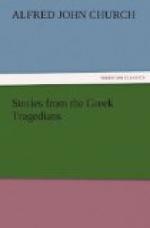To this the chief of the old men made answer, “O lady, we would counsel thee first to ask the Gods that they turn away all evils, and bring to pass all that is good; and next to make offerings to Earth and to the dead, and specially to thy husband King Darius, whom thou sawest in visions of the night, that he may send blessings from below to thy son, and turn away all trouble into darkness and nothingness.”
“This will I do,” said the Queen, “so soon as I shall have gone back to the palace. But first I would hear certain things of you. Tell me, my friends, in what land is this Athens of which they speak?”
“It is far to the west,” the old men made reply, “towards the setting of the sun.”
“And why did my son seek to subdue this city?”
“Because he knew that if he prevailed against it all Greece should be subject unto him.”
“Hath it, then, so many men that draw the sword?”
“Such an army it hath as hath wrought great damage to the Medes.”
“And hath it aught else, as wealth sufficient?”
“There is a spring of silver, a treasure hid in their earth.”
“Do the men make war with bows?”
[Illustration: ATOSSA’S dream.]
“Not so; they have spears for close fighting and shields.”
“And who is master of their army?”
“They are not slaves or subjects to any man.”
“How, then, can they abide the onset of the Persians?”
“Nay, but so well they abide it that they slew a great army of King Darius.”
“What thou sayest is ill to hear for the mothers of them that are gone.”
And when the Queen had thus spoken, the counsellors espied a man of Persia running to them with all speed, and knew that he bare tidings from the hosts, whether good or evil. And when the man was come, he cried out, “O land of Persia, abode of proud wealth, how are thy riches destroyed, and the flower of thy strength perished! ’Tis an ill task to bring such tidings, yet I am constrained to tell all our trouble. O men of Persia, the whole army of our land hath perished.”




